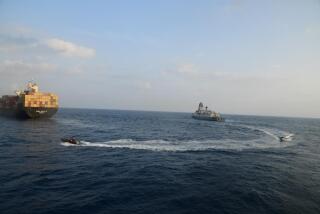British Delay Rescue of 600 in S. Yemen
- Share via
DJIBOUTI — A British attempt to rescue about 600 foreigners from an oil refinery near the embattled South Yemeni capital of Aden was postponed Monday amid conflicting reports of renewed fighting between rival Marxist factions in South Yemen’s week-old civil war.
A rebel radio station apparently run by forces loyal to former head of state Abdul-Fattah Ismail said that all fighting has ceased and that the new “collective leadership” is firmly in control after ousting strongman Ali Nasser Hasani. He was reported to have fled the country several days ago.
However, the Bahrain-based Gulf News Agency, quoting “reliable sources” in neighboring Yemen, said Hasani has returned to Aden and that government forces are in control of most of the country, including the capital.
All communications with South Yemen remained cut, and Western diplomats trying to monitor developments from Djibouti, 150 miles southwest of Aden, said the situation remains unclear.
‘No One at the Top’
“The impression we get is that they may have stopped active fighting. However, that’s not certain, and there seems to be no one person at the top yet,” said a Western diplomat who asked not to be identified by name.
Other diplomats said that even if the fighting has abated, it is likely to resume in view of reports that South Yemen’s fiercely antagonistic and well-armed tribesmen are still converging from the hills toward the coastal battle fronts around Aden.
“My impression is that it is not over yet, but merely undergoing the transition from an ideological conflict into a tribal one,” another diplomat said.
The evacuation of foreigners from South Yemen, meanwhile, appeared to have run into more problems Monday when Queen Elizabeth’s royal yacht Britannia put off an attempt to rescue about 600 people from Little Aden, the site of a major oil refinery several miles west of the capital.
A spokesman for the British consulate in Djibouti, where the evacuees were to have been taken, said he was informed by London that the evacuation did not take place as planned Monday afternoon and that the Britannia was spending the night at anchor off Aden, presumably to try again today.
The Britannia was forced to cut short a similar evacuation attempt from an Aden beachfront last Saturday, when the local truce collapsed and the area came under fire.
Three other ships arrived in Djibouti earlier in the day with about 500 evacuees. The British frigate Jupiter brought out 209 foreigners from Dinjibar, east of Aden, while two Soviet freighters arrived a few hours later with several hundred Soviet evacuees.
South Yemen, the only Marxist state in the Arab world, is Moscow’s closest ally in the Middle East, and the Soviet Union has several thousand advisers, diplomats and military personnel staffing an important base there. Most of the Soviets arriving Monday were men, although a few women and children, the last of the dependents, were on board.
Their arrival brought the number of foreigners ferried out of Aden in the joint British-Soviet evacuation to more than 4,500, according to Western diplomats. Between 700 and 1,000 foreigners were still awaiting evacuation, not including Soviet military and diplomatic personnel staying behind, according to Western estimates.
Besides the 600 foreigners of various nationalities in Little Aden, those still trying to get out included 33 United Nations personnel and 31 Japanese marooned in two hotels in central Aden, where heavy fighting took place over the weekend. The only two Americans known to have been in Aden when the fighting broke out Jan. 13 have already left.
Some evacuees reaching Djibouti described Aden as a “city of death,” with bodies and burned-out military vehicles lining the streets.
They said the capital was closed down except for the fighting, with food stores shut and no water or electricity.
One Iraqi woman, evacuated aboard a Soviet vessel, told of corpses in the streets and said “soot-covered, wrecked tanks were all over the city when we left last Saturday,” the Associated Press reported.
The diplomatic reports that South Yemeni tribesmen were increasingly being drawn into the fighting were confirmed by several of the British evacuees arriving from Dinjibar aboard the Jupiter.
Garth Wood, a British engineer working on a water pipeline project in Abyan, just east of Aden, said that as the evacuees drove in a convoy to the coast, they saw armed tribesmen descending from the surrounding hills in Toyota pickups and surplus Soviet military vehicles. Wood said the tribesmen appeared to be converging on an area east of Aden and a few miles inland to rendezvous with rebel forces.
Marxist Power Struggle
Caught in the middle of a power struggle between the rival Marxist factions, the Soviets were believed to favor the more moderate Hasani, even though they are understood to have been displeased by his efforts to seek better relations with Saudi Arabia, Oman and other conservative Arab states in the region.
Western diplomats in Djibouti said they have no evidence indicating Soviet involvement in the fighting, however.
Ismail, a hard-line Marxist who was deposed as strongman in a power struggle with Hasani in 1980, returned to Aden last fall after a five-year exile in Moscow. Along with First Deputy Prime Minister Ali Ahmed Antar, he is said to be a key figure in the effort to overthrow Hasani.
More to Read
Sign up for Essential California
The most important California stories and recommendations in your inbox every morning.
You may occasionally receive promotional content from the Los Angeles Times.













